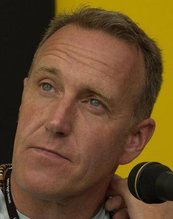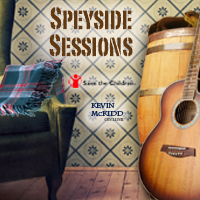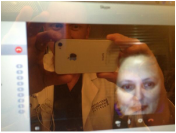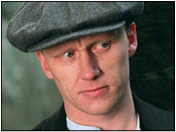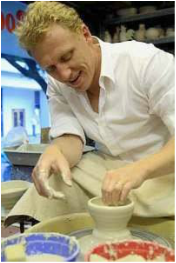Wiki
Personal Website
IMDb
Q1. Music is used to convey so much in 16 Yrs of Alcohol, it not only helps set the scene but its sometimes almost another character in the scene. Music is part of the language Frankie speaks, informs his scenes with Helen, is part of what brings them into each others' lives, can you talk a bit about how you chose the songs, how you highlighted them in the scenes?
A1. In an odd way I always saw the film as a kind of musical. The songs were part of the narrative and were used in a very traditional way. The world I came from was full of people singing in bars and clubs and was very much part of the local culture so it felt very natural to have real songs being sung in the film.
The music has a meditative feel and reflects the mood of the central character played by Kevin. It hopefully captures his melancholy and joy and all moods and atmosphere in between. I was always clear with the actors of the music that would be playing in their heads at any given moment and I hope this helped them understand their character even more.
Music as cinema language is an amazing way to allow characters to breathe without dialogue. There is very little dialogue in the film as i felt confident the music could do that work for me along with great acting.
Q2. Violence is also a major character in this film, from the emotional violence in Frankie's childhood to the violence he perpetrates and is perpetrated upon him as he grows into the proverbial angry young man. Can you talk a bit about the choice to have Frankie claim that violence finally as he introduces himself at an AA meeting?
A2. Frankie uses violence as a protective shield to keep people as far from his emotional centre as possible. When he allows people to get close it ends up disastrously. He is much stronger he feels when he remains cold and distant. Alcohol fuels his violence, makes him capable of prosecuting terrible physical acts against anyone who stands in his way. He knows he needs to break the cycle but doesn’t know how. When he eventually realises that it can only be done through love, it’s too late. His identity from a young age is forged through violent acts which he knows he needs to find a way out of but every time he tries he feels vulnerable, alone, lost and weak.
Q3.There's so much that I love about 16 years. I'm interested to know what some of Richard's favorite scenes are, and why?
A3. My favourite scenes in the film are when Frankie sits with his parents covered in cob webs, the kind of scene which set the film apart from the social realist films that come out of the UK. I loved the gang scenes as they reminded me of my dead brother who I was very fond of. I think Kevin in the AA scene is very simple but is the most powerful moment in the film as it captures a man coming to terms with what and who he is. He’s amazing in that scene.
He did it in one take......incredible.
Q4. Most of the time light seems to have a yellow tint on it, is that a conscious decision or a technical need? If specifically selected, what is the reason?
Q5. Was any part of the movie ad- lib (improv) or everything is as scripted?
A4/5. The colour scheme of the film moves from monochromatic simplicity to a whisky coloured sadness. Most of the characters dress in black and white with the odd splash of colour. I thought this was the easiest way to shoot the past, in color but in black and white. I thought long and hard about the clothes and the colour scheme and atmosphere I was trying to create, its really important to get all the small details correct. For the most part the film is the same as my story board and early designs with little improvisation or radical changes. It was pretty much conceived shot by shot before we started.
Q6. Movie is very dark and serious, but for sure good times during filming. Any funny story on Set that you want to share?
A6. Kevin is a natural comedian, a really funny guy and it was only clear to me after a few weeks that he was constantly impersonating some of my more idiosyncratic characteristics and weaving them into his depiction of Frankie. He was a joy to work with and Im very happy that life has shone a big light on him and his talent.
Q7. The use of photography is very prominent in 16 Years what was the inspiration for the use of photography in the film? What did you hope to achieve?
A7. I think photography freezes time. I used stills in the film because Frankie was always fighting time trying to slow it down so he could savour the good things that were happening to him. It gave us a chance to enjoy him as a happy, smiling, joyous man who was in love but was essentially doomed. Sometimes movies move to quickly and don’t give us enough time to dwell on big moments like these. Still photography did that for me.
Q8. Kevin mentioned that you were very influenced by one of my favorite filmmakers Wong Kar Wai and his movie "In the Mood for Love" what aspects of that film and his work have inspired you in your directing of 16 Years of Alcohol?
A8. I love the meditative nature of Wong Kar Wai’s work and his use of poetic language which is normally narrated by the key character. They say that narration is only used when a film doesn’t work which is utter rubbish. Think of Kar Wai’s work or Terence Malick or Stanley Kubrick - all my favourite directors who all use narration.
Q9. Have you thought of any alternative ending?
A9. There was never an alternative ending. Frankie was doomed.
Q10. Was Kevin your first choice as Frankie?
A10. Kevin was the only person I spoke to about the film and we coincidentally lived close together in the county of Bedfordshire so had plenty of opportunities to get to know one another. We are from very different areas of Scotland but essentially from the east coast which in some ways make us similar in the way that we spent our youth being battered by the North Sea winds.
Q11. What other projects can we look forward to from you in the near future?
A11. Im about to start a new film called Wayland’s Song about a man who comes home injured from the war in Afghanistan to look for his missing daughter. It’s a thriller but more importantly its about the state of the world around me, which , from where Im looking is not good.
Exclusive @ Kevin McKidd Online
